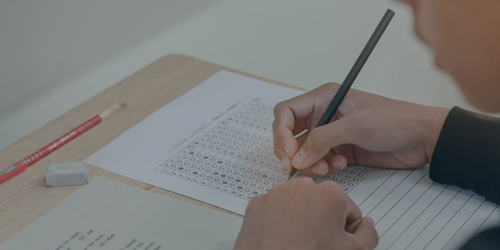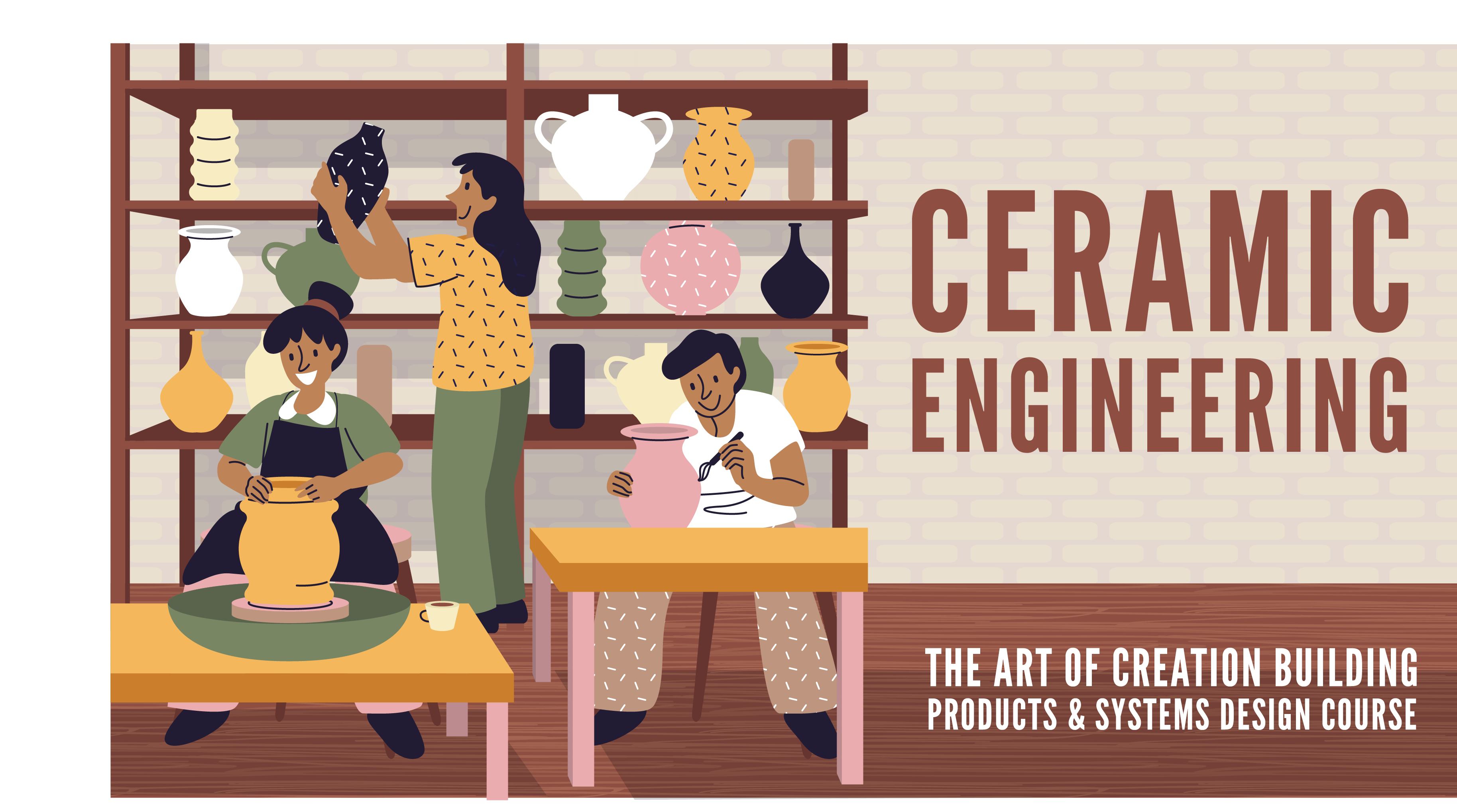Ceramic Engineering is one of the most important branches of engineering which refers to the study of the designing, creation, and manufacturing of ceramic materials created from inorganic & non-metallic materials. The process of creating ceramics needs the help of the action of heat, or at lower temperatures using precipitation reactions from high purity chemical solutions. Ceramic materials may have a crystalline structure, with long-range order on the atomic scale. Ceramic materials are used in the gas burner nozzles, ballistic protection, nuclear fuel uranium oxide pellets, bio-medical implants, jet engine turbine blades, and missile nose cones. Ceramics are also used for manufacturing aircraft engines, airframes, Space shuttles tiles, etc. Earlier ceramics were used for creating smooth and colourful surfaces but now they are used for domestic, industrial, buildings, and art projects.
What you will focus on?
- Learning mathematical concept and the science to create materials
- Designing, Creating, and Manufacturing of ceramic materials
- Conducting research on ceramic materials
- Testing the chemical, physical, and heat-resisting properties of materials
- Testing the texture, durability, glazing, color, and refractory properties of finished materials
Highlights:
| Course Name | Ceramic Engineering |
|---|---|
| Course Level | B. Tech (Bachelor of Technology) and M.Tech (Master of Technology) |
| Duration |
B.Tech - 4 years M.Tech - 2 years |
| Examination Type | Semester Type |
| Eligibility |
B.Tech: Must have completed 10+2 with a minimum of 50% mark in aggregate M.Tech: B.Tech or Equivalent degree in Engineering |
| Top Recruiters | Research Institutes, Ceramic Manufacturing Companies, Arts and Design Companies, etc. |
| Top Career/Job Profiles | Ceramic Engineer, Ceramic Technologist, Ceramic Designer, Technician, Professor, etc. |
Top Colleges:
- NIT (National Institute of Technology), Rourkela
- IIT BHU (Banaras Hindu University), Varanasi
- University of Calcutta
- Andhra University
- Ceramic Glass and Ceramic Research Institute, Kolkata
- Anna University, Chennai
- Rajasthan Technical University
Eligibility Criteria:
Candidates need to check their eligibility criteria before applying for any degree in Ceramic Engineering. Candidates have to at least complete their 10 +2 with a minimum mark of 50% in aggregate. Check the full eligibility in the table below:
| Course | Duration | Eligibility | Entrance |
|---|---|---|---|
| B. Tech in Ceramic Engineering | 4 years |
|
JEE Main, BITSAT, VITEEE |
| M.Tech in Ceramic Engineering | 2 years |
|
GATE, TANCET |
Syllabus:
For B.Tech in Ceramic Engineering:
It is a 4 year-long course.
| Year I | Year II |
|---|---|
| Professional Communication | Materials Science |
| Environmental Studies | Manufacturing Practices |
| Fundamentals of Mechanical Engineering | Structure and Properties of Ceramic Materials |
| Engineering Mathematics – 1 | Mathematical Methods |
| Engineering Mathematics – 2 | Ceramic Raw Materials |
| Engineering Physics | Ceramic Phase Diagrams and Phase Transformation |
| Engineering Chemistry | Basic Ceramic Practices |
| Fundamentals of Electrical Engineering | Heat and Mass Transfer |
| Technical Communication | Thermodynamics and Phase Equilibria in Ceramic Systems |
| Fundamentals of Electronics Engineering | Particle Mechanics and Fluid Flow Process |
| Engineering Drawing | Humanities |
| Fundamentals of Computer | Universal Human Values |
| Year III | Year IV |
|---|---|
| Techniques for Materials Characterization | Fuel, Furnace & Pyrometry |
| Process Calculations | Steel Plant Refractories |
| Humanities / Language | Ceramic Composites |
| Glass and Glass Ceramics | Cement and Concrete |
| Ceramic Whitewares | Ceramic Coating & High-Temperature Ceramic Processes |
| Advanced Ceramics | Ceramic Coating & High-Temperature Ceramic Processes |
| Industrial Training – 1 | Industrial Training – 2 |
| Refractories | Glass Technology & Application |
| Glass Engineering | Industrial whitewares |
| Department Elective | Advanced Electro-ceramics |
| Nano Technology | Bio-Ceramics |
| - | Project |
For M.Tech in Ceramic Engineering:
It is for 2 years and a 4-semester duration.
| Semester I | Semester II |
|---|---|
| Structure & Properties of Engineering Ceramics | Advances in Phase Diagrams |
| Principles of Ceramic Processing & Fabrication | Nanomaterials |
| Professional Elective 1,2 ,3 | Professional Elective 4, 5, 6 |
| Instrumental Analysis Laboratory | Electroceramics Laboratory |
| Characterization of Ceramic Products Laboratory | Process Ceramics Laboratory |
| Seminar & Technical Writing I | Seminar & Technical Writing II |
| Semester III | Semester IV |
|---|---|
| Seminar & Technical Writing III | Seminar & Technical Writing IV |
| Summer Research/Industrial Project | Comprehensive Viva Voce |
| Research Project Work I | Research Project Work II |
| Research Project Review I | Research Project Review II |
| - | Dissertation |
List of Electives:
| Shaped and Unshaped Refractories | Advanced Electroceramics |
| Refractories for Metallurgical & Allied Processes | High-Temperature Ceramic Processing |
| Advanced Structural Ceramics | Science of Sol-Gel Processing |
| Non-Oxide Ceramics | Magnetic Ceramics |
| Advances in Bio-ceramics | Techniques of Materials Characterization |
| Energetic | Ceramics in High Tech Applications |
| Advanced Glass and Glass Ceramics | Special Topic in Ceramic Engineering I |
| Advanced Composites | Special Topic in Ceramic Engineering II |
| Computer-Aided Designing and Modelling of Ceramic Systems | Special Laboratory in Ceramic Engineering I |
| Friction and Wear of Materials | Special Laboratory in Ceramic Engineering II |
Admission Process:
For B.Tech in Ceramic Engineering:
- Candidates should clear the eligibility criteria
- Most of the colleges offer admission based on scores of entrance exams such as JEE Main, BITSAT, VITEEE.
- Some colleges provide admission directly based on the marks secured in the 10th and 12th.
For M.Tech in Ceramic Engineering:
- Candidate should be eligible for the degree
- Institutions provide admission through valid scores of GATE, TANCET, and other such entrance exams
- Some colleges also offer admission on the basis of marks secured in the undergraduate degree (B.Tech)
Skills Required:
- A ceramic engineer should have good communication skills.
- He/she must be a problem solver. He could recognize the nature of the problem and discover original, unusual, or creative ways to solve problems.
- He should have strength in Math and Science, can solve a problem using the mathematical method or formula.
- Manage the time of self and others, can motivate and direct people.
- Teamwork is must needed, use several methods to learn or teach new things.
|
Global Average salary $72,323 |
Growth rate of the job 7% |
Average salary in India 4 - 6 Lakh Rupees per Annum |
Top Entrances:
1. JEE Main (Joint Entrance Examination)
- Minimum Qualification: Candidates must have passed 10 and +2 with Physics and Mathematics as compulsory subjects along with Chemistry/Biotechnology/Biology/Technical Vocation subjects
- Exam Duration: 3 Hours
- Exam Mode: Online
- Minimum Qualification: Candidates qualifying the JEE Main are eligible
- Exam Duration: 3 Hours
- Exam Mode: Online
3. BITSAT (Birla Institute of Technology and Science Admission Test)
- Minimum Qualification: Candidates must have passed 10 and +2 with Mathematics, Physics, Chemistry/Biology as their main subjects with a minimum of 75% mark in aggregate.
- Exam Duration: 3 Hours
- Exam Mode: Online
4. VITEEE (Vellore Institute of Technology Engineering Entrance Examination)
- Minimum Qualification: Candidates should have scored 60% or more in 10th and 12th with Physics, Chemistry, and Mathematics/ Biology as main subjects.
- Exam Duration: 2.5 Hours
- Exam Mode: Online
5. GATE (Graduate Aptitude Test in Engineering)
- Minimum Qualification: Candidates should have a Bachelor degree (4 years after 10+2) in Engineering/Technology
- Exam Duration: 3 Hours
- Exam Mode: Online
6. TANCET (Tamil Nadu Common Entrance Test)
- Minimum Qualification: Candidates should have a Bachelor’s degree or its equivalent with at least a 50% mark in aggregate
- Exam Duration: 2 Hours
- Exam Mode: Offline
Career and Job prospects:
After completing your degree in Ceramic Engineering, one can get job opportunities at various Ceramic Manufacturing Companies, Research centres, top universities, etc. Different types of job roles for this course are mentioned in the table below:
| Job Profile | Average Salary Per Annum |
|---|---|
| Ceramic Engineer | 4 - 7 Lakh Rupees |
| Ceramic Technologist | 5 - 9 Lakh Rupees |
| Ceramic Designer | 3 - 6 Lakh Rupees |
| Technician | 2 - 3 Lakh Rupees |
| Construction manager | 5 - 9 Lakh Rupees |
| Production Worker | 1.5 - 3 Lakh Rupees |
| Professor | 4 - 6 Lakh Rupees |
Employment Areas:
- Research Institutes
- Ceramic Manufacturing Companies
- Arts and Design Companies
- Construction Companies
- Colleges and Universities
- Private Ceramic Business
Top Recruiters:
- Indian Space Research Organization (ISRO)
- Defense Metallurgical Research Laboratory (DMRL)
- Institute for Plasma Research (IPR)
- Bhabha Atomic Research center (BARC)
- Kajaria Ceramics Ltd.
- Somany Ceramics Ltd
- Asian Granito India Ltd.
- Bajaj Tiles
Top Hiring Cities in India:
- Morbi
- Gurugram
- New Delhi
- Noida
- Ahmedabad
- Bangalore
- Mumbai
FAQs:
Q: What ceramic engineers do?
A: Ceramic Engineers usually develop new ceramic products as well as methods & equipment for processing ceramic materials. They also teach and do research in Universities and work with a wide variety of products, ranging from glassware & electronic components to nuclear reactors.
Q: What is the average salary of Ceramic Engineers?
A: The average salary of a Ceramic Engineer is 4 - 7 lakh rupees per annum
Q: What is the minimum eligibility required for B.Tech in Ceramic Engineering?
A: For B.Tech in Ceramic Engineering the candidate must have completed 10+2 with a minimum of 50% mark in aggregate with PCM as its main subjects.












